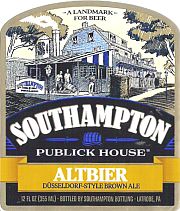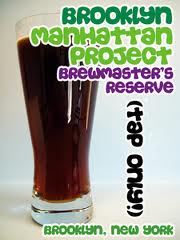CHELSEA BREWING HOSTS LARGEST MANHATTAN CASK ALE FEST – AGAIN!
By John Fortunato
Conveniently located along Manhattan’s West Side waterfront at Pier 59, spacious
Chelsea Brewing Company kept ‘real ale’ drinkers satisfied with forty-one cask-conditioned beers from twenty-two American (and one Scottish) breweries at its fourth Cask Ale Festival held October 9
th through 11
th.
Since early ’08, Chelsea’s highly successful spring-fall festivals have given respect to ‘old-styled’ unfiltered hand-pumped ales conditioned in firkin tanks for less carbonated, fuller flavored, unpasteurized versions of the usual gas-pressurized keg-barreled beer.
Opened for business since 1995, Chelsea initially bottled two of its regular beers: Checker Cab Blonde and Sunset Red Ale. Bottling was an expensive proposition so the 10,000 square foot location now housing Chelsea began dispensing only freshly crafted tap beer. Fourteen years hence, this Big Apple beacon still prospers, featuring its strongest beer lineup yet for autumn ’09s Cask Ale fest.
"It’s a challenge to reach out and get these beers. We get good cooperation, even amongst local competitors (Blue Point/ Brooklyn/ Captain Lawrence)," Chelsea entrepreneur Patrick Greene insists as I imbibe Chelsea’s heady wood-burnt pine-tarred cherry-soured black coffee-powered
Black Hole Stout.
"We even reached out to nearby Jersey brewer, High Point, who don’t usually do cask ales. We get the opportunity to see what’s out there and spend much time crafting our own (nine entries)," he adds.
With the help of longtime beer enthusiast/
Yankee Brew News publisher Bill Metzger and heralded San Francisco-originated brewer Chris Sheehan (formerly of dearly departed 20 Tank Brewery), Greene assembled an impressive original lineup of cask ales for this fourth shindig. An inspiring stylistic range of cross-country offerings including a plethora of stouts, a half-dozen India Pale Ales, and a few pumpkin brews were readied.
"My brewers do an excellent job keeping up the tradition, receiving firkins, storing them, and racking them. We do it only twice yearly. We get bigger beers (with heavier alcohol consistency) in fall. The lighter stuff comes in spring. It’s both sides of the coin for the beer year," Greene says while I chomp on a croissant. "We enjoy it and encourage customers to not only taste our beers, but also whatever else is out there that they usually don’t get in New York. People who’ve had our product could rely on consistency. We have a good customer base. Young customers have all grown up on microbrews nowadays. It’s no longer new and exotic. They’ve already experienced and enjoyed these beers."
Starting 11 A.M. on Friday, I began tossing back generous offerings. An early fave amongst fellow peers was Buffalo’s
Pearl Street Flamande Rouge, a Flemish sour red ale with Lambic-like tannic cherry skin tartness, green grape pucker, and lime-y brimstone acidity. Pearl Street’s
Saber’s Edge Double IPA also faired well, countering peach syrupy creaminess with floral lemon-peeled bitterness.
Colorado-based Oskar Blue’s
Dale’s Oak Old Chub (soft whiskey-licked cocoa-malted pineapple-teased Scotch Ale) and, to a lesser extent,
Dale’s Wet Hop Nugget (lemon-grapefruit soured Pale Ale), also appeased late morning drinkers.
After cheese and crackers, I returned to liquid consumption. Indiana-based Three Floyd’s
Alpha King Pale Ale took a bold black tea-like hold as syrupy pear and ripe apple illusions reached a creamy caramel malt finish.
Southernmost brewer, Saint Somewhere (of Tarpin Springs, Florida), provided two worthy Belgian knockoffs, Saison-styled apple-tart grape-tannic
Saison Du Chene and cider-soured honey-sapped
Pays Du Soleil.
I favored Clipper City’s
Great Pumpkin Imperial Ale (with its wood-lacquered pumpkin pie theme and banana-chipped cinnamon-nutmeg influence) over admirable
Weyerbacher Imperial Pumpkin (a softer gourd-spiced seasonal given deeper candi-sugared cinnamon-nutmeg resolve).
High Point, a northern Jersey brewer chiefly known for robust German-styled wheat beers, submitted
cask-conditioned Ramstein Classic Wheat (sugared fig, sour cider, and crushed grape illusions counter spicy Belgian chocolate) and tranquil sour-fruited
Ramstein Octoberfest.
Greene chimes in, "The one thing about brewing – no offense to brewmasters – it’s one of the last apprenticeship fields in the country. It takes years of experience to get a feel for it. I equate it to being an instinctive grandmother with a recipe. She doesn’t need to use a measuring cup or spoon."
People start filing in quickly around 4 PM as I made my departure only to return Saturday at noon with my parents for six more delectable libations. Three from host brewer, Chelsea, included dry-hopped grapefruit-lingered
Hop Angel IPA, black chocolate-y molasses-sapped coffee-soured prune-dried crème brulee-like
Cream Stout, and incredible bourbon-barreled cherry-pureed apple-soured rum-soaked perfume-scented Pina Colata-finishing
1000 Gyle Imperial Mild.
While enjoying Cobb Salad, tried Scotland’s creamy spruce-induced dark-spiced apricot-grape-soured
BrewDog Hardcore IPA and even better grassy perfume-hopped floral-fruited pear-apple-pineapple-slung
Brooklyn Blast (from neighboring competitor Brooklyn Brewery).
Cocoa-dried chocolate nibs-nipped
Corner Jackhammer Old Ale (from Ypsilanti, Michigan) then closed the session before I headed home for some good ol’ college football.
Other beers imbibed during Friday’s session included three Midwest brown ales: hop-charred cocoa-powdered chocolate-resinous espresso-finishing stout-like
Michigan Bavarian Dark, prune-fig-soured rye-malted tea-backed currant-tart
The Livery Imperial Brown Rye Ale (both from Michigan), and Wisconsin-based walnut-embittered hazelnut-sweetened caramel-malted
Bull Falls Nut Brown Ale.
Besides Pearl Street’s, Chelsea’s, Brooklyn’s and BrewDog’s above-listed India Pale Ale’s, there were two fine Michigan entries. Tangy peach-pear-pineapple-tangerine-fruited orange rind-embittered floral-bound
Dark Horse Crooked Tree IPA and sharp piney-hopped creamy-centered cherry-pineapple-apricot-doused
Michigan High Seas India Pale Ale were no slouches.
A large contingent of stouts included black chocolate-y cocoa-chalked anise-stained fig-dried
Blue Point Oatmeal Stout, barley-roasted hop-toasted mocha-dried cherry-perfumed
Dark Horse One Oatmeal Stout, Colorado’s butterscotch-sugared brown chocolate-y
Left Hand Imperial Stout, and California’s chocolate-spiced nutty-bottomed black cherry-soured pecan-buttered
Moylan Dragoons Dry Irish Stout.
Pennsylvania’s dry coffee bean-embittered black chocolate-whirred raisin-pureed cherry-tinged
Troegs Java Head Stout topped its bottled version. Vermont’s Belgian-styled candi-sugared caramel-burnt oats-toasted grape-soured chocolate-bordered
Magic Hat Big Stout proved most unique.
To round-up, sullen yellow-fruited grassy-leafed
Bull Falls White Water Cream Ale and soft yellow-orange-fruited woody-hopped dry-finishing
Chelsea U.S.A. English-style Summer Ale had winsome appeal. Hazelnut-chocolate-informed
Left Hand Blackjack Porter benefited from sustained cocoa bean-dried caramel-burnt toffee-clad finish.
Here’s the rest of my conversation with Chelsea founder Patrick Greene. Born and bred in Brooklyn, he attended Brooklyn Tech and NYU and now resides in Long Island’s South Shore.
Do you think the general public may be initially put-off by cask ale’s flattened-out body and warm serving temperature?
PATRICK GREENE: The warmer temperature allows a lot of the illusional flavors to come out that may not be distinct if you drink it cold. Don’t get me wrong. I like cold beer, but in a tasting scenario, the warmer atmosphere gives the full range of what was created in the beer. It’s the next step.
How’d you get involved with craft brewing?
In 1987, Manhattan Brewing Company was under construction to reopen. I met an English brewer. The brewery had occupancy of the whole building. The landlord said they had to bring everything down and put it in a smaller space. We handled the mechanical and technical end the cooling and heating system. In the two years I was there, we added four stories, put in a glass elevator, and renovated the floors. I loved the idea of brewing. As compensation, the brewer gave good quality beers to the workers. It was the best bribe. All my workers are now microbrew drinkers. I was building restaurants as well and got the opportunity to construct (now-defunct) Westside Brewing Company at 76
th and Amsterdam. I designed it, installed the equipment, and we couldn’t make enough beer for consumption on premises. At the time, we had very good product in the developing stages like Checker Cab Blonde Ale and Sunset Red. We worked on small batches.
When did brewmaster Chris Sheehan come aboard?
He came from 20 Tank Brewery in San Francisco. It was very popular, but when the city refurbished the waterfront, that small brewery couldn’t afford to be there any longer. He enjoys his stouts but became very upset when an article claimed he was just an experienced stout brewer. He thought that was just one more style of beer created that was finally getting recognition and was only part of his forte. The Hop Angel he makes is a tremendous IPA. We don’t stay to the guidelines or get caught up in new fads like Souble IPA’s – super-saturated hoppy beers. They’re great for a taste or two, but our beers are designed for consumption. We do make ‘big beers,’ but only do them once or twice yearly. We’re geared towards consumers who want to enjoy a few. It’s great to have a 10% alcohol brew on tap, but you have to be cautious how you sell it (due to quick inebriation). Our Imperial Mild (in actuality, a strong barleywine) will have you going sideways.
Why aren’t there more brewpubs in New York City? Vermont, Massachusetts, and New Hampshire are overflowing with them.
The real estate market is expensive and limits what could be done. You’d have to go into a developing area like Greenpoint or Williamsburg on the Brooklyn side. Even Bedford Stuyvesant or Bushwick. It’s less expensive to put up a tasting room and maintain brewing operations as a manufacturer. There’s tremendous room for opportunity in those depressed areas. They’d give real estate tax incentives to go into those areas. You wouldn’t need much space.
How important is sanitizing and having a good water source at your disposal?
Sanitation is a must. Keep everything clean. On a large scale, like Chelsea Brewery, we have the ability to sanitize and purify everything we do. New York has good water for brewing. I put in a filtration system, but took it apart after a year. We never used it. The water is incredible here in New York. The Southeast usually has to filtrate (due to less pure water sources). People who have to treat water are envious of us. That’s one aspect we have naturally.
-John Fortunato
 Sassy Marzen-styled seasonal utilizes suitable Munich and Vienna malts to create red-fruited barley-roasted almond-toasted sweetness countering hop-spiced orange peel bittering. Tangy apple, apricot, pear, and tangerine ripeness soaks into alcohol whir of robust lager that could be mistaken for crisp red ale in a sec. Busier than most in its stylistic range.
Sassy Marzen-styled seasonal utilizes suitable Munich and Vienna malts to create red-fruited barley-roasted almond-toasted sweetness countering hop-spiced orange peel bittering. Tangy apple, apricot, pear, and tangerine ripeness soaks into alcohol whir of robust lager that could be mistaken for crisp red ale in a sec. Busier than most in its stylistic range.  Sassy Marzen-styled seasonal utilizes suitable Munich and Vienna malts to create red-fruited barley-roasted almond-toasted sweetness countering hop-spiced orange peel bittering. Tangy apple, apricot, pear, and tangerine ripeness soaks into alcohol whir of robust lager that could be mistaken for crisp red ale in a sec. Busier than most in its stylistic range.
Sassy Marzen-styled seasonal utilizes suitable Munich and Vienna malts to create red-fruited barley-roasted almond-toasted sweetness countering hop-spiced orange peel bittering. Tangy apple, apricot, pear, and tangerine ripeness soaks into alcohol whir of robust lager that could be mistaken for crisp red ale in a sec. Busier than most in its stylistic range.  Delightful fruit cocktail with juniper-soaked alcohol kick. Sinewy yeast particles cloud amber-hazed ‘unfiltered double India Pale Ale,’ thickening its herbaceous pine-needled fruit-spiced resolve. Vibrant hard-candied orange-grapefruit-pineapple ripeness, creamy caramel malting, and gorgeous floral bouquet provide sweet relief to resinous spruce-tipped Cascade hop bittering.
Delightful fruit cocktail with juniper-soaked alcohol kick. Sinewy yeast particles cloud amber-hazed ‘unfiltered double India Pale Ale,’ thickening its herbaceous pine-needled fruit-spiced resolve. Vibrant hard-candied orange-grapefruit-pineapple ripeness, creamy caramel malting, and gorgeous floral bouquet provide sweet relief to resinous spruce-tipped Cascade hop bittering. 
 Respectable mahogany-bodied crimson-highlighted coffee-roasted porter retains bittersweet hop-charred cocoa bean richness. Chewy molasses-like dark chocolate center girds mocha latte, vanilla, and licorice illusions. Thick tar-like finish deepens bitterness and maximizes robustness.
Respectable mahogany-bodied crimson-highlighted coffee-roasted porter retains bittersweet hop-charred cocoa bean richness. Chewy molasses-like dark chocolate center girds mocha latte, vanilla, and licorice illusions. Thick tar-like finish deepens bitterness and maximizes robustness.  Profusely mouth-puckered beige-hazed yellow-glazed ‘tart wheat ale’ creates vinous Sauvignon Blanc or Belgian Gueuze feel (when not sweetened by raspberry and woodruff syrup). Sour green grape, Granny Smith apple, and unripe lemon fruiting reinforces wild yeast herbage and leathery barnyard funk. Grassy-bottomed horsehide, hay, and maize illusions breach tertiary tannic cherry tartness at tail end of light-bodied carbolic spritzer. Despite heightened brettanomyces level, acidic tendencies are kept in check.
Profusely mouth-puckered beige-hazed yellow-glazed ‘tart wheat ale’ creates vinous Sauvignon Blanc or Belgian Gueuze feel (when not sweetened by raspberry and woodruff syrup). Sour green grape, Granny Smith apple, and unripe lemon fruiting reinforces wild yeast herbage and leathery barnyard funk. Grassy-bottomed horsehide, hay, and maize illusions breach tertiary tannic cherry tartness at tail end of light-bodied carbolic spritzer. Despite heightened brettanomyces level, acidic tendencies are kept in check.  On tap, ‘wet-hopped’ copper-hazed autumnal seasonal shelters leathery hay-horsehide earthiness, dry fresh-cut wheat chaff, and sun-drenched corn-maize singe with sour lemon-bruised grapefruit zest. Resinous grassy-hopped vegetal restraint and soapy metallic tinge provide pliant backdrop.
On tap, ‘wet-hopped’ copper-hazed autumnal seasonal shelters leathery hay-horsehide earthiness, dry fresh-cut wheat chaff, and sun-drenched corn-maize singe with sour lemon-bruised grapefruit zest. Resinous grassy-hopped vegetal restraint and soapy metallic tinge provide pliant backdrop. 
 On tap, robust cola-hued dry-bodied Belgian wit/black beer merger leans towards darker side. Sharp chocolate nuttiness fends off hop-roasted black coffee bittering and wood-burnt charcoal tarring before candi-sugared crystal-malted cherry puree, prune, and plum illusions provide sweet counteractive splendor. Bourbon warmth mellows cocoa nibs-informed mocha finish.
On tap, robust cola-hued dry-bodied Belgian wit/black beer merger leans towards darker side. Sharp chocolate nuttiness fends off hop-roasted black coffee bittering and wood-burnt charcoal tarring before candi-sugared crystal-malted cherry puree, prune, and plum illusions provide sweet counteractive splendor. Bourbon warmth mellows cocoa nibs-informed mocha finish. 